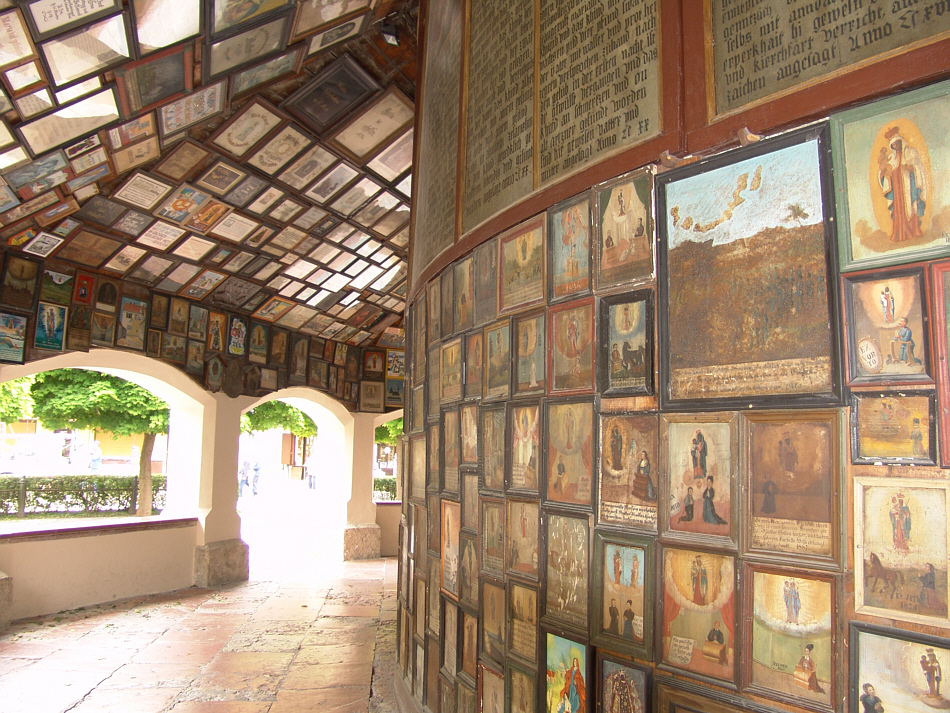|
Pilgrimage
A pilgrimage is a journey, often into an unknown or foreign place, where a person goes in search of new or expanded meaning about their self, others, nature, or a higher good, through the experience. It can lead to a personal transformation, after which the pilgrim returns to their daily life. Background Pilgrimages frequently involve a journey or search of moral or spiritual significance. Typically, it is a journey to a shrine or other location of importance to a person's beliefs and faith, although sometimes it can be a metaphorical journey into someone's own beliefs. Many religions attach spiritual importance to particular places: the place of birth or death of founders or saints, or to the place of their "calling" or spiritual awakening, or of their connection (visual or verbal) with the divine, to locations where miracles were performed or witnessed, or locations where a deity is said to live or be "housed", or any site that is seen to have special spiritual power ... [...More Info...] [...Related Items...] OR: [Wikipedia] [Google] [Baidu] |
Pilgrim
A pilgrim (from the Latin ''peregrinus'') is a traveler (literally one who has come from afar) who is on a journey to a holy place. Typically, this is a physical journey (often on foot) to some place of special significance to the adherent of a particular religious belief system. In the spiritual literature of Christianity, the concept of pilgrim and pilgrimage may refer to the experience of life in the world (considered as a period of exile) or to the inner path of the spiritual aspirant from a state of wretchedness to a state of beatitude. History Pilgrims and the making of pilgrimages are common in many religions, including the faiths of ancient Egypt, Persia in the Mithraic period, India, China, and Japan. The Greek and Roman customs of consulting the gods at local oracles, such as those at Dodona or Delphi, both in Greece, are widely known. In Greece, pilgrimages could either be personal or state-sponsored. In the early period of Hebrew history, pilgrims traveled ... [...More Info...] [...Related Items...] OR: [Wikipedia] [Google] [Baidu] |
Holy Land
The Holy Land; Arabic: or is an area roughly located between the Mediterranean Sea and the Eastern Bank of the Jordan River, traditionally synonymous both with the biblical Land of Israel and with the region of Palestine. The term "Holy Land" usually refers to a territory roughly corresponding to the modern State of Israel and the modern State of Palestine. Jews, Christians, and Muslims regard it as holy. Part of the significance of the land stems from the religious significance of Jerusalem (the holiest city to Judaism, and the location of the First and Second Temples), as the historical region of Jesus' ministry, and as the site of the first Qibla of Islam, as well as the site of the Isra and Mi'raj event of 621 CE in Islam. The holiness of the land as a destination of Christian pilgrimage contributed to launching the Crusades, as European Christians sought to win back the Holy Land from Muslims, who had conquered it from the Christian Eastern Roman Empire in ... [...More Info...] [...Related Items...] OR: [Wikipedia] [Google] [Baidu] |
Shrine Of Bahá'u'lláh
A shrine ( la, scrinium "case or chest for books or papers"; Old French: ''escrin'' "box or case") is a sacred or holy space dedicated to a specific deity, ancestor, hero, martyr, saint, daemon, or similar figure of respect, wherein they are venerated or worshipped. Shrines often contain idols, relics, or other such objects associated with the figure being venerated. A shrine at which votive offerings are made is called an altar. Shrines are found in many of the world's religions, including Christianity, Islam, Hinduism, Buddhism, Chinese folk religion, Shinto, indigenous Philippine folk religions, and Asatru as well as in secular and non-religious settings such as a war memorial. Shrines can be found in various settings, such as churches, temples, cemeteries, museums, or in the home. However, portable shrines are also found in some cultures. Types of shrines Temple shrines Many shrines are located within buildings and in the temples designed specifically for worship, s ... [...More Info...] [...Related Items...] OR: [Wikipedia] [Google] [Baidu] |
Shrine
A shrine ( la, scrinium "case or chest for books or papers"; Old French: ''escrin'' "box or case") is a sacred or holy space dedicated to a specific deity, ancestor, hero, martyr, saint, daemon, or similar figure of respect, wherein they are venerated or worshipped. Shrines often contain idols, relics, or other such objects associated with the figure being venerated. A shrine at which votive offerings are made is called an altar. Shrines are found in many of the world's religions, including Christianity, Islam, Hinduism, Buddhism, Chinese folk religion, Shinto, indigenous Philippine folk religions, and Asatru as well as in secular and non-religious settings such as a war memorial. Shrines can be found in various settings, such as churches, temples, cemeteries, museums, or in the home. However, portable shrines are also found in some cultures. Types of shrines Temple shrines Many shrines are located within buildings and in the temples designed specifically ... [...More Info...] [...Related Items...] OR: [Wikipedia] [Google] [Baidu] |
Islam
Islam (; ar, ۘالِإسلَام, , ) is an Abrahamic monotheistic religion centred primarily around the Quran, a religious text considered by Muslims to be the direct word of God (or '' Allah'') as it was revealed to Muhammad, the main and final Islamic prophet.Peters, F. E. 2009. "Allāh." In , edited by J. L. Esposito. Oxford: Oxford University Press. . (See alsoquick reference) " e Muslims' understanding of Allāh is based...on the Qurʿān's public witness. Allāh is Unique, the Creator, Sovereign, and Judge of mankind. It is Allāh who directs the universe through his direct action on nature and who has guided human history through his prophets, Abraham, with whom he made his covenant, Moses/Moosa, Jesus/Eesa, and Muḥammad, through all of whom he founded his chosen communities, the 'Peoples of the Book.'" It is the world's second-largest religion behind Christianity, with its followers ranging between 1-1.8 billion globally, or around a quarter of the world's ... [...More Info...] [...Related Items...] OR: [Wikipedia] [Google] [Baidu] |
Báb
The Báb (b. ʿAlí Muḥammad; 20 October 1819 – 9 July 1850), was the messianic founder of Bábism, and one of the central figures of the Baháʼí Faith. He was a merchant from Shiraz in Qajar Iran who, in 1844 at the age of 25, claimed to be a messenger of God. He took the title ''Báb'' (; ar, باب; meaning "Gate" or "Door"), a reference to the deputy of the Hidden Imam, while instigating a religious revolution that proposed the abrogation of Islamic laws and traditions, and the establishment of a new religion. Though he was popular among the lower classes, he faced opposition from the orthodox clergy and government, which eventually executed him and thousands of his followers, known as Bábís. The Báb composed numerous letters and books in which he introduced the ideas of a new social order and a promise that a new divine messenger was coming soon. He encouraged learning arts and sciences, gave prescriptions to regulate marriage, divorce, and inheritance, and set ... [...More Info...] [...Related Items...] OR: [Wikipedia] [Google] [Baidu] |
Tourism
Tourism is travel for pleasure or business; also the theory and practice of touring (other), touring, the business of attracting, accommodating, and entertaining tourists, and the business of operating tour (other), tours. The World Tourism Organization defines tourism more generally, in terms which go "beyond the common perception of tourism as being limited to holiday activity only", as people "travelling to and staying in places outside their usual environment for not more than one consecutive year for leisure and not less than 24 hours, business and other purposes". Tourism can be Domestic tourism, domestic (within the traveller's own country) or International tourism, international, and international tourism has both incoming and outgoing implications on a country's balance of payments. Tourism numbers declined as a result of a strong economic slowdown (the late-2000s recession) between the second half of 2008 and the end of 2009, and in consequence of t ... [...More Info...] [...Related Items...] OR: [Wikipedia] [Google] [Baidu] |
Ritual
A ritual is a sequence of activities involving gestures, words, actions, or objects, performed according to a set sequence. Rituals may be prescribed by the traditions of a community, including a religious community. Rituals are characterized, but not defined, by formalism, traditionalism, invariance, rule-governance, sacral symbolism, and performance. Rituals are a feature of all known human societies. They include not only the worship rites and sacraments of organized religions and cults, but also rites of passage, atonement and purification rites, oaths of allegiance, dedication ceremonies, coronations and presidential inaugurations, marriages, funerals and more. Even common actions like hand-shaking and saying " hello" may be termed as ''rituals''. The field of ritual studies has seen a number of conflicting definitions of the term. One given by Kyriakidis is that a ritual is an outsider's or " etic" category for a set activity (or set of actions) that, to the out ... [...More Info...] [...Related Items...] OR: [Wikipedia] [Google] [Baidu] |
Abrahamic Religion
The Abrahamic religions are a group of religions centered around worship of the God of Abraham. Abraham, a Hebrew patriarch, is extensively mentioned throughout Abrahamic religious scriptures such as the Bible and the Quran. Jewish tradition claims that the Twelve Tribes of Israel are descended from Abraham through his son Isaac and grandson Jacob, whose sons formed the nation of the Israelites in Canaan (or the Land of Israel); Islamic tradition claims that twelve Arab tribes known as the Ishmaelites are descended from Abraham through his son Ishmael in the Arabian Peninsula. In its early stages, Israelite religion was derived from the Canaanite religions of the Bronze Age; by Iron Age I, it had become distinct from other Canaanite religions as it shed polytheism for monolatry. The monolatrist nature of Yahwism was further developed in the period following the Babylonian captivity, eventually emerging as a firm religious movement of monotheism. In the 1st centur ... [...More Info...] [...Related Items...] OR: [Wikipedia] [Google] [Baidu] |
Jean Dalby Clift
Jean Dalby Clift was an American priest of the Episcopal Church and a pastoral counselor in private practice. She was the author of books in the fields of psychology and spirituality. "Dr. Clift has had many roles in her life, including lawyer, spiritual director, pastoral counselor, author, lecturer, workshop presenter, priest, mother, grandmother, and poet." She lectured and gave workshops in the United States, Australia, Europe, Asia and Africa on such topics as pastoral counseling, prayer, spiritual growth, journaling, pilgrimage, and the Myers-Briggs Type Indicator. Three of her five books were co-authored with her husband, the Reverend Wallace Clift. Early career and education Born February 21, 1930, in Texas, Clift received a B.A. (1950) and J.D. (1952) from the University of Texas at Austin. She practiced law at Baker, Botts, Andrews and Parish in Houston, Texas, and in 1954 married another attorney at the firm, Wallace Clift. After her husband went to seminary, Jean C ... [...More Info...] [...Related Items...] OR: [Wikipedia] [Google] [Baidu] |
Votive Offering
A votive offering or votive deposit is one or more objects displayed or deposited, without the intention of recovery or use, in a sacred place for religious purposes. Such items are a feature of modern and ancient societies and are generally made in order to gain favor with supernatural forces. While some offerings were apparently made in anticipation of the achievement of a particular wish, in Western cultures from which documentary evidence survives it was more typical to wait until the wish has been fulfilled before making the offering, for which the more specific term ex-voto may be used. Other offerings were very likely regarded just as gifts to the deity, not linked to any particular need. In Buddhism, votive offering such as construction of stupas was a prevalent practice in Ancient India, an example of which can be observed in the ruins of the ancient Vikramshila University and other contemporary structures. Votive offerings have been described in historical Roman e ... [...More Info...] [...Related Items...] OR: [Wikipedia] [Google] [Baidu] |
Judaism
Judaism ( he, ''Yahăḏūṯ'') is an Abrahamic, monotheistic, and ethnic religion comprising the collective religious, cultural, and legal tradition and civilization of the Jewish people. It has its roots as an organized religion in the Middle East during the Bronze Age. Modern Judaism evolved from Yahwism, the religion of ancient Israel and Judah, by the late 6th century BCE, and is thus considered to be one of the oldest monotheistic religions. Judaism is considered by religious Jews to be the expression of the covenant that God established with the Israelites, their ancestors. It encompasses a wide body of texts, practices, theological positions, and forms of organization. The Torah, as it is commonly understood by Jews, is part of the larger text known as the ''Tanakh''. The ''Tanakh'' is also known to secular scholars of religion as the Hebrew Bible, and to Christians as the " Old Testament". The Torah's supplemental oral tradition is represented by later t ... [...More Info...] [...Related Items...] OR: [Wikipedia] [Google] [Baidu] |





.jpg)





